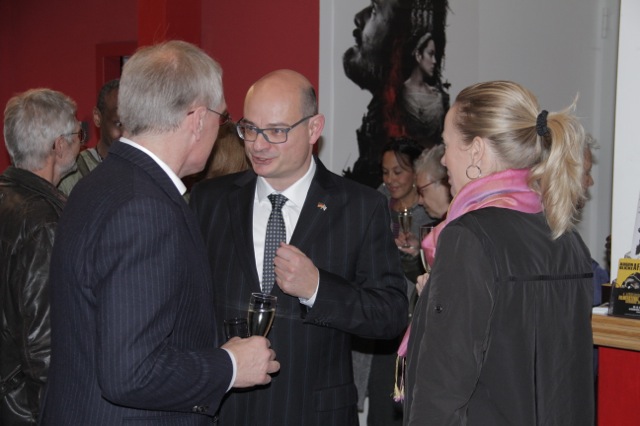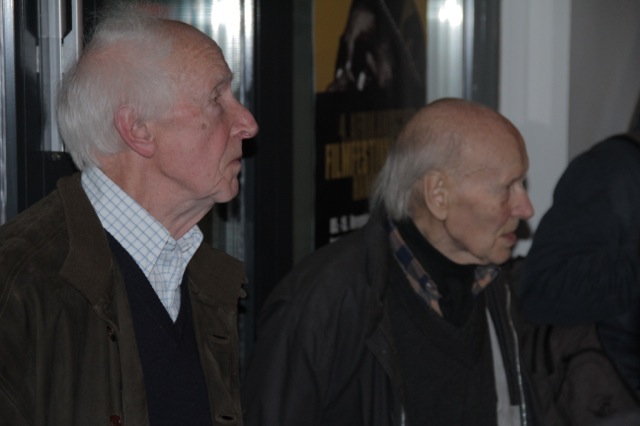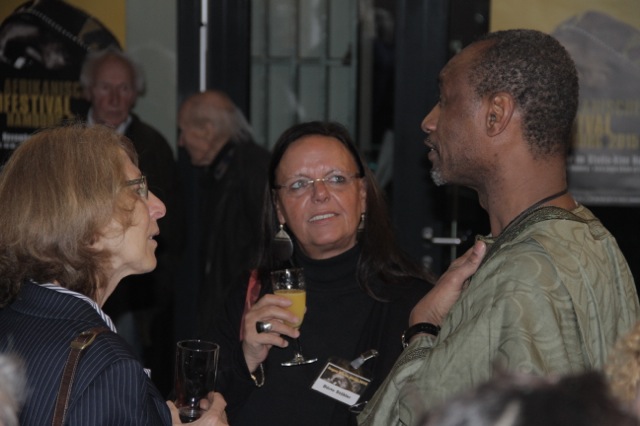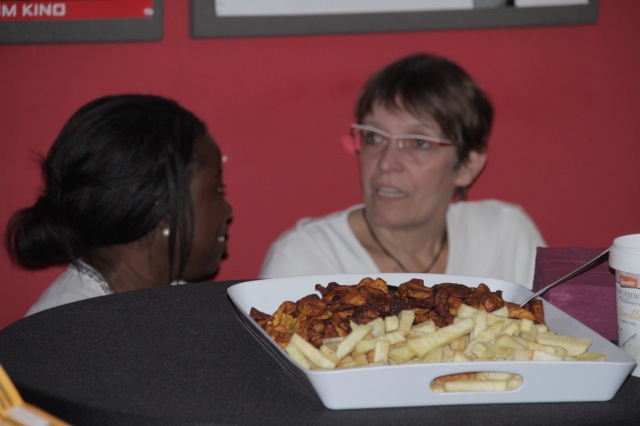AUGEN BLICKE AFRIKA 2015 – Nachlese
Unser 4. afrikanisches Filmfestival AUGEN BLICKE AFRIKA 2015 ist am Sonntag mit vier Filmen zu Ende gegangen. Wir Macher des Festivals sind sehr stolz und zufrieden. Trotz einiger Pannen und Ungewissheiten hat letztendlich alles geklappt: Alle Filme konnten gezeigt werden, alle eingeladenen Gäste sind rechtzeitig gekommen und es gab bei fast allen Vorführungen regen Zuspruch.
Die absoluten Renner vor ausverkauftem Saal waren der wunderbare Film unseres diesjährigen Schirmherrn Dani Kouyaté aus Burkina Faso “Soleils”, das Flüchtlingsdrama “Hope” von Boris Lojkine sowie “Finding Fela” von Alex Gibney, das spannende Portrait des Begründers des Afrobeat aus Nigeria.
 Hope |
 Finding Fela |
Der Film “Soleils” beeindruckte durch seine ruhige Erzählweise. Dani Kouyaté, der selbst aus einer Griotfamilie stammt, führt dabei die traditionelle Form des Erzählens in, wie er sagte, dem zeitgemäßen Medium des Films weiter. Selten ist in einem afrikanischen Film so tief in der Tradition und der Philosophie eines afrikanischen Volkes gegraben worden. Besonders beeindruckend die Aufdeckung der Menschenrechtserklärung im großen Mandigoreich in Westafrika 500 Jahre vor der Deklaration der Menschenrechte in Europa. Damit stellt der Film heraus, dass Afrika durchaus kein dunkler und geschichtsloser Kontinent ist, wie selbst große europäische Denker es behaupteten.
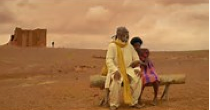 Soleils |
 Dani Kouyaté |
Besonders positive Resonanz gab es bei dem Film “Miners shot down” von Rehad Desai, der sowohl die politischen als auch die individuellen Aspekte der Niederschießung friedlich demonstrierender Minenarbeiter in Südafrika zeigte. In der anschließende Diskussion mit dem britischen Anwalt James Nichol wurde noch einmal deutlich, wie dieser gewaltsam beendete Streik durch die regierende Partei ANC unter dem Präsidenten Jacob Zuma die politische Landschaft Südafrikas auf Dauer verändert hat.
 Überhaupt waren in diesem Jahr die Dokumentarfilme die beeindruckenden. Es sind authentische Filme, die die Lebensbedingungen in afrikanischen Regionen intensiv beschreiben. Dazu gehören “Beats of the Antonov” von Hajooj Kuka aus dem Sudan, “Hamou beya – Sandfishers” von Andrey Samouté Diarra aus Mali, “Ady Gasy – The Malagasy way” von Nantenaina Lova aus Madagaskar.
Überhaupt waren in diesem Jahr die Dokumentarfilme die beeindruckenden. Es sind authentische Filme, die die Lebensbedingungen in afrikanischen Regionen intensiv beschreiben. Dazu gehören “Beats of the Antonov” von Hajooj Kuka aus dem Sudan, “Hamou beya – Sandfishers” von Andrey Samouté Diarra aus Mali, “Ady Gasy – The Malagasy way” von Nantenaina Lova aus Madagaskar.
 Nantenaina Lova |
 Hajooj Kuka |
 Andrey S. Diarra |
Eingeladen hatten wir die beiden Filmemacher Filipe Henriques aus Guinea Bissau mit seinem Film “O Espinho da Rosa” und Cheick Fantamady Camara aus Guinea mit “Morbayassa – Le serment de Koumba”. Die Diskussion nach Henriques ungewöhnlichem und verstörendem Film gab den Zuschauern Aufschluss und Orientierungshilfe über die Filmidee und deren Umsetzung. Die Geschichte des Films hat ihren Ursprung in den nächtlichen Erzählungen seines Großvaters. Henriques verbindet diese mit Berichten über Inzest. Diese Elementen bringt er in eine moderne Form, eine Mischung aus Liebesgeschichte, Science Fiktion und Krimi. “Morbayassa” ist eine typische Geschichte vieler afrikanischer Frauen, die sich aus Zwangsverhältnissen befreien und nach ihrer eigenen Identität suchen.
 Filipe Henriques |
 Hans-Jörg Heinrich und Cheick F. Camara |
In den beiden Kurzfilmprogrammen beeindruckte vor allem der Spielfilm “Twaaga” von Cedric Ido aus Burkina Faso. Dieser Film verbindet die Fantasiewelt des Jungen Manu, ein Superheld zu sein, mit der tragischen Realität des burkinischen “Superhelden” Thomas Sankara, die beide am Ende getötet werden.
Weitere Highlights des Festivals waren unsere beiden Schwerpunktthemen.
Vor allem der Dokumentarfilm “Boy Saloum” der Regisseurin Audrey Gallet und die anschließenden Ausführungen zu der Protestbewegung “Y’en a marre” des eingeladenen senegalesischen Rappers und Politaktivisten “Thiat” rissen die Anwesenden immer wieder zu tosendem Applaus hin. Aufgrund dieser lang anhaltenden Proteste wurde eine dritte illegale Amtszeit des amtierende senegalesische Präsident Abdoulaye Wade verhindert.
 Thiat |
 Diskussion im Kino |
Der zweite Film “Revolution mit bloßen Händen” zeigte, wie vor einem Jahr in Burkina Faso die Bürgerbewegung “Bürgerbesen” den ebenfalls eine dritte illegale Amtszeit anstrebenden Präsidenten Blaise Compaoré buchstäblich aus dem Land fegte.
Zu unserem zweiten Schwerpunkt “Queer Afrika”, zur Situation von Lesben, Schwulen und Transgender in Afrika, hatten wir Imam Muhsin Hendricks und die Jugendreferentin Wisaal Abrahams der südafrikanischen Organisation “The inner circle” sowie Uta Schwenke vom “LSVD” und der “Hirschfeld Eddy Stiftung” zur Diskussion eingeladen. Diese entwickelte sich zu einer sehr persönlichen Befragung der beiden südafrikanischen Gäste über ihren Lebensweg, ihrem “coming out” und die Reaktion in ihrer muslimischen Gemeinde, bei Freunden und Bekannten. Sie berichteten über ihre Organisation “The inner circle” und die Ausweitung ihrer Aktivitäten in afrikanische Länder bis hin nach Asien und Europa. Uta Schwenke stellte die engagierte Arbeit des “LSVD” in Deutschland und Afrika dar.
 Gefreut haben wir uns auch über die Zusammenarbeit mit Uta Reuster-Jahn, die am “AAI” der Uni Hamburg Videoproduktionen aus Tansania vorstellte. Bei der Veranstaltungsreihe ging es auch um die Problematik der Übersetzung von Swahili ins Deutsche.
Gefreut haben wir uns auch über die Zusammenarbeit mit Uta Reuster-Jahn, die am “AAI” der Uni Hamburg Videoproduktionen aus Tansania vorstellte. Bei der Veranstaltungsreihe ging es auch um die Problematik der Übersetzung von Swahili ins Deutsche.
Auch konnten wir zwei zehnte Schulklassen zur Vorführung des Films “Making of – Kamikaze” des tunesischen Regisseurs Nouri Bouzid begrüßen. Der Film zeigt anschaulich, wie junge Menschen in bedrängten persönlichen Situationen von fundamentalistischen Anwerbern in deren Kreise hineingezogen und politisch missbraucht werden können. Dazu hatten wir eine spannende Diskussion mit Mahmut Erdem, der als Anwalt Familien betreut, deren Kinder zum IS gehen und dem Studenten für Islamwissenschaft, Iftikar Malik, der ebenfalls Kontakt zu betroffenen Familien hat.
Mit einem stimmungsvollen Tanzfest am letzten Samstag des Festivals feierten wir mit einer bunten Mischung von afrikanischen Klassikern unser gelungenes afrikanisches Filmfestal.
 Für November 2016 machen wir uns nun auf die Suche nach neuen spannenden Filmproduktionen vom vielfältigen Kontinent Afrika.
Für November 2016 machen wir uns nun auf die Suche nach neuen spannenden Filmproduktionen vom vielfältigen Kontinent Afrika.
 Bis dahin bleibt dran, lasst die Filme nachwirken und macht neue Begegnungen mit Afrika.
Bis dahin bleibt dran, lasst die Filme nachwirken und macht neue Begegnungen mit Afrika.
AUGEN BLICKE AFRIKA 2015 – Some Afterthoughts
Our fourth African film festival AUGEN BLICKE AFRIKA 2015 drew to a close about three weeks ago with a final screening of four films. As the organizers of this festival we are very proud and pleased with the outcome. Despite some mishaps and uncertainties everything eventually worked out: all films could be shown, all invited guests arrived in time, and almost all showings found some lively reception.
The absolute frontrunners, which sold out the theater, were the wonderful movie „Soleils“ by our patron this year Dani Kouyaté from Burkina Faso, the refugee drama „Hope“ by Boris Lojkine, as well as „Finding Fela“ by Alex Gibney, a fascinating portrait of the founder of Afrobeat from Nigeria.
 Hope |
 Finding Fela |
„Soleils“ impressed with its calm narrative style. Dani Kouyaté, himself a member of a griot family, is continuing the traditional form of narration, as he said, through the contemporary medium of film. Rarely has anyone dug so deeply into the tradition and philosophy of an African people in an African film. The revelation of the declaration of human rights in the large West African Mandingo empire 500 years prior to the declaration of human rights in Europe was particularly impressive. Thereby the film emphasizes that Africa is not a dark continent devoid of history, as even great European thinkers have claimed.
 Soleils |
 Dani Kouyaté |
The responses to the film „Miners shot down“ were particularly positive. It presented political as well as individual facets of the shootings of peacefully demonstrating miners in South Africa. The following discussion with the British lawyer James Nichol showed once more how this strike that was put down violently through the ruling ANC party under President Jacob Zuma has permanently changed the political landscape of South Africa.
 In general, this year the documentaries left the deepest impact. They are authentic films that acutely describe the conditions of life in African regions. Among them are „Beats of the Antonov“ by Hajooj Kuka from Sudan, „Hamou beya – Sandfishers“ by Andrey Samouté Diarra from Mali, and „Ady Gasy – The Malagasy way“ by Nantenaina Lova from Madagascar.
In general, this year the documentaries left the deepest impact. They are authentic films that acutely describe the conditions of life in African regions. Among them are „Beats of the Antonov“ by Hajooj Kuka from Sudan, „Hamou beya – Sandfishers“ by Andrey Samouté Diarra from Mali, and „Ady Gasy – The Malagasy way“ by Nantenaina Lova from Madagascar.
 Nantenaina Lova |
 Hajooj Kuka |
 Andrey S. Diarra |
We had invited two filmmakers: Filipe Henriques from Guinea-Bissau with his film „O Espinho da Rosa“ and Cheik Fantamady Camara from Guinea with „Morbayassa – Le serment de Koumba“. The discussion after Henriques’ unusual and upsetting film provided the audience with some insight and guidance about the idea of the film and its realization. The story of the film originates in his grandfather’s telling of stories at night. Henriques combined this story with accounts of incest. These elements were transported into a modern form, a mix between a love story, science fiction and a crime thriller. „Morbayassa“ is a typical story of many African women who break free from coercive conditions and are searching for their own identity.
 Filipe Henriques |
 Hans-Jörg Heinrich und Cheick F. Camara |
From the two programs of short movies the feature film „Twaaga“ by Cedric Ido from Burkina Faso stood out. This film ties together the fantasy world of the boy Manu, in which he is a superhero, with the tragic reality of the Burkinabe „superhero“ Thomas Sankara; both were killed at the end.
More highlights of the festival were our two central themes.
In particular the documentary „Boy Saloum“ by director Audrey Gallet and the subsequent remarks on the protest movement “Y’en a marre” by our guest, the Senegalese rapper and political activist Thiat prompted repeated hurricanes of applause from the audience. Because of those long lasting protests a third and unconstitutional term of the then sitting Senegalese president Abdoulaye Wade could be prevented.
 Thiat |
 Diskussion im Kino |
The second film „Revolution mit bloßen Händen“ showed how a year ago the citizens’ movement “Bürgerbesen” literally swept President Blaise Compaoré, who also attempted a third unconstitutional term, out of office in Burkina Faso.
For our second thematic focus “Queer Africa” on the situation of lesbians, gays, and transgender people in Africa we had invited Imam Muhsin Hendricks and youth adviser Wisaal Abrahams of the South African organization “The Inner Circle” as well as Uta Schwenke of the “LSVD” and the “Hirschfeld Eddy Foundation” to join in discussion. This exchange turned into a very personal interview with both South African guests about their lives, their „coming out,“ and the reactions of their Muslim community, friends, and acquaintances. They gave a lively report on their organization “The Inner Circle” and the expansion of its activities to other African countries and as far as Asia and Europe. Uta Schwenke introduced the dedicated work of the “LSVD” in Germany and Africa.
 We were pleased to collaborate with Uta Reuster-Jahn who introduced films from Tanzania at Hamburg University’s “Asian African Institut” that focused on problems of translating Swahili into German.
We were pleased to collaborate with Uta Reuster-Jahn who introduced films from Tanzania at Hamburg University’s “Asian African Institut” that focused on problems of translating Swahili into German.
We were also able to welcome two tenth-grade classes to a screening of „Making of – Kamikaze“ by Tunisian producer Nouri Bouzid. The film illustrates how young people in dire personal situations can be drawn into the circles of fundamentalist recruiters and be politically abused. On that topic we had an exciting discussion with Mahmut Erdem who, as a lawyer, counsels families whose children join ISIS and a student of Islamic studies, Iftikar Malik who is also in contact with such families.
On the last Saturday of the festival we danced and celebrated the completion of a successful fourth African film fest with a potpourri of musical classics.
 Now we are starting to search for new exciting film productions from the diverse African continent for November 2016.
Now we are starting to search for new exciting film productions from the diverse African continent for November 2016.







